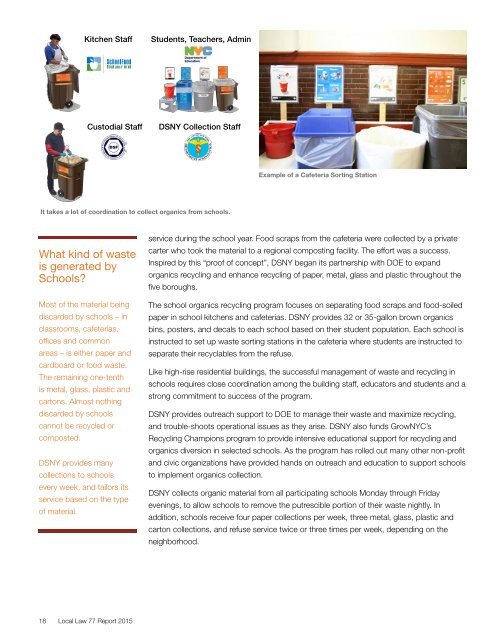2015 NYC Organics Collection Report
1jcwPY1
1jcwPY1
Create successful ePaper yourself
Turn your PDF publications into a flip-book with our unique Google optimized e-Paper software.
School Kitchens and Cafeterias<br />
Kitchen Staff<br />
Students, Teachers, Admin<br />
Custodial Staff<br />
DSNY <strong>Collection</strong> Staff<br />
Example of a Cafeteria Sorting Station<br />
It takes a lot of coordination to collect organics from schools.<br />
What kind of waste<br />
is generated by<br />
Schools?<br />
Most of the material being<br />
discarded by schools – in<br />
classrooms, cafeterias,<br />
offices and common<br />
areas – is either paper and<br />
cardboard or food waste.<br />
The remaining one-tenth<br />
is metal, glass, plastic and<br />
cartons. Almost nothing<br />
discarded by schools<br />
cannot be recycled or<br />
composted.<br />
DSNY provides many<br />
collections to schools<br />
every week, and tailors its<br />
service based on the type<br />
of material.<br />
service during the school year. Food scraps from the cafeteria were collected by a private<br />
carter who took the material to a regional composting facility. The effort was a success.<br />
Inspired by this “proof of concept”, DSNY began its partnership with DOE to expand<br />
organics recycling and enhance recycling of paper, metal, glass and plastic throughout the<br />
five boroughs.<br />
The school organics recycling program focuses on separating food scraps and food-soiled<br />
paper in school kitchens and cafeterias. DSNY provides 32 or 35-gallon brown organics<br />
bins, posters, and decals to each school based on their student population. Each school is<br />
instructed to set up waste sorting stations in the cafeteria where students are instructed to<br />
separate their recyclables from the refuse.<br />
Like high-rise residential buildings, the successful management of waste and recycling in<br />
schools requires close coordination among the building staff, educators and students and a<br />
strong commitment to success of the program.<br />
DSNY provides outreach support to DOE to manage their waste and maximize recycling,<br />
and trouble-shoots operational issues as they arise. DSNY also funds Grow<strong>NYC</strong>’s<br />
Recycling Champions program to provide intensive educational support for recycling and<br />
organics diversion in selected schools. As the program has rolled out many other non-profit<br />
and civic organizations have provided hands on outreach and education to support schools<br />
to implement organics collection.<br />
DSNY collects organic material from all participating schools Monday through Friday<br />
evenings, to allow schools to remove the putrescible portion of their waste nightly. In<br />
addition, schools receive four paper collections per week, three metal, glass, plastic and<br />
carton collections, and refuse service twice or three times per week, depending on the<br />
neighborhood.<br />
18 Local Law 77 <strong>Report</strong> <strong>2015</strong>


